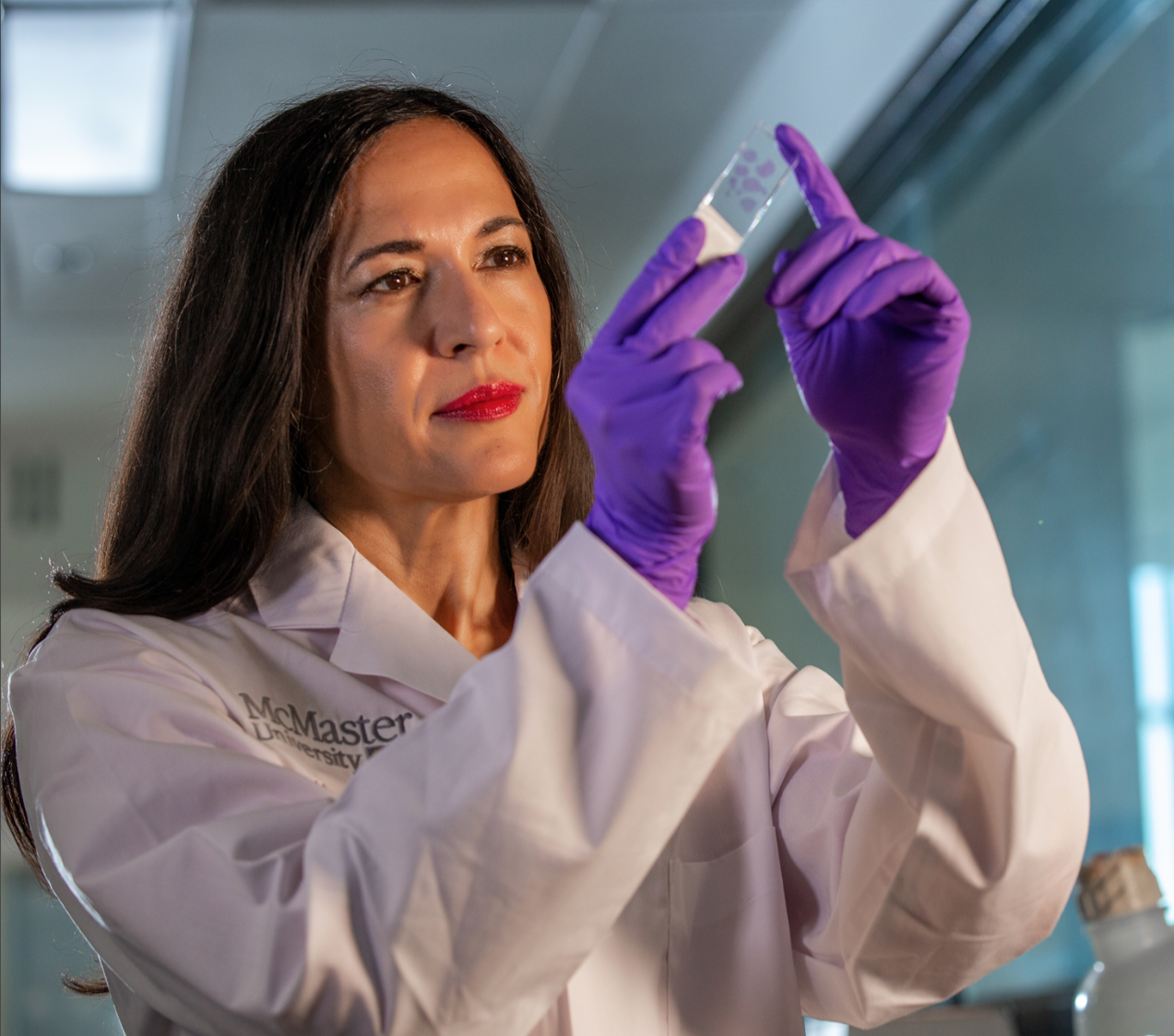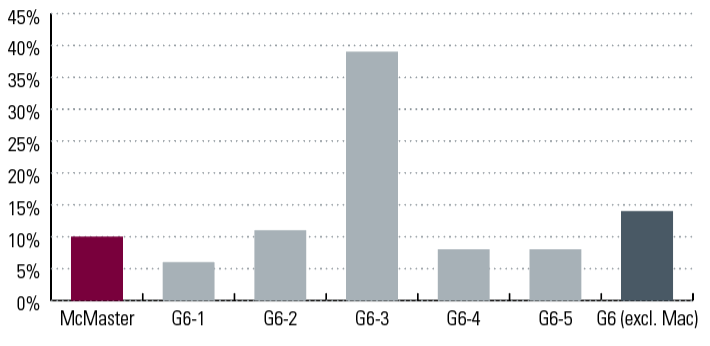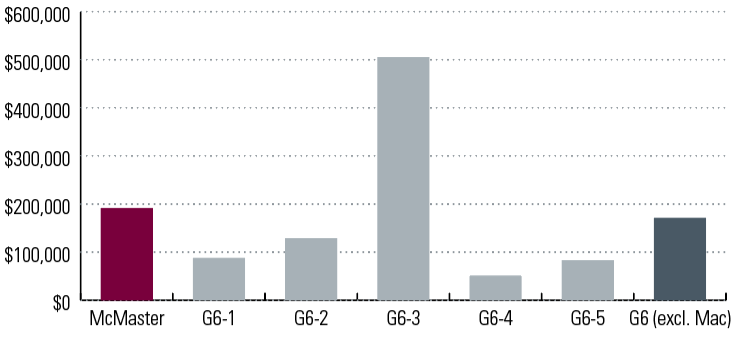Priority 3: Research and Scholarship
Information Box Group

Sixteen McMaster researchers were featured on the Clarivate Analytics 2022 list of highly cited researchers, five were given a Cross-Field distinction, which identifies researchers that have significant influence across multiple fields.
Global leadership and impact that continues to redefine how McMaster engages in research and scholarship, while exploring human knowledge and understanding
Information Box Group
Sixteen McMaster researchers – representing the top one per cent of citations in a given year – were featured on the Clarivate Analytics 2022 list of highly cited researchers.
Learn More
The Global Nexus School for Pandemic Prevention & Response builds upon McMaster University’s long history of teaching and learning innovation and infectious disease research to prepare students to work across disciplines and become leaders who can bridge gaps, solve problems, and find equitable solutions to the complex challenges that infectious diseases pose to society. In 2022/23 Global Nexus:
In 2022, six McMaster researchers were named Canada Research Chairs and five had their chairs renewed. Also in 2022, two researchers were named Fellows in the Royal Society of Canada’s (RSC) Academy of Science, two were elected to the RSC’s College of New Scholars, Artists and Scientists and one was named a member of the Order of Canada. Other awards presented to McMaster researchers in 2022-2023 include the 2022 Canada Gairdner Wightman Award, the 2022 Einstein Foundation Award, the Blaise Pascal Medal, the Dorothy Killam Fellowship, the Canadian Association for Clinical Microbiology and Infectious Diseases’ 2023 John G. FitzGeraldAward and the Canadian Society for Immunology 2023 Hardy Cinader Award.
Fifteen McMaster researchers were awarded over $2.4 million from the Social Sciences and Humanities Research Council (SSHRC) to support research on the influence of tech companies on policy and public services, the self-care practices of post-secondary students, the origins and prevention of racial biases and the ways we detect and engage with cybercrime threats.
Nearly $1.8 million from the Krembil Foundation will support research to craft a new paradigm in the understanding and treatment of neurodegenerative diseases, using Huntington’s disease (HD) as a model. Researchers are developing methods of assessing the earliest events of these diseases, potentially decades before disease onset, to shift the focus from treatment to prevention.
A health sciences researcher is leading a $37 million international, multi-center trial investigating a potential new treatment regimen for diabetic macular edema using Vabsymo (faricimab), a medication already approved for use in Canada. The collaboration with F. Hoffmann-La Roche Ltd brings together the pharmaceutical industry and academia to enhance patient care for retinal diseases.

The Ontario government announced $6.8 million in funding to help increase medical isotope production at the McMaster Nuclear Reactor. The added capacity will also enable more research in clean energy and small modular reactors (SMRs).
$1.8 million from the Azrieli Foundation is supporting the creation of a Hamilton-based Pediatric Learning Health System (LHS) for Neurodevelopment. Housed at the Ron Joyce Children’s Health Centre, part of McMaster Children’s Hospital, it will embed research, resources, skill sets, expertise and patient and family perspectives directly into the care process, allowing for continuous communication, improvements and implementation of best practices in real time.
Two McMaster researchers received more than $800,000 from SSHRC to pursue research projects that will inform action and address disparities related to race, gender, and other forms of diversity.
McMaster ranked second in research intensity and ninth overall in the top 50 research universities in Canada (Research Infosource
Inc., 2022).
Seven McMaster-led research projects received a total of $61 million from the Canadian Institutes of Health Research to advance medical research, training and innovation. The Pan-Canadian Accelerating Clinical Trials Consortium – hosted by the Population Health Research Institute (PHRI) – received $39 million to expand its clinical trial networks, support clinical trial units and improve collaboration and knowledge sharing, as well as the number, efficiency and quality of clinical trials in Canada.
Supported by a $2.5-million SSHRC Partnership Grant (2021-2026), Participedia, housed within the Centre for Human Rights and Restorative Justice, is a global network and crowdsourcing platform dedicated to democratic innovations that includes almost 900 organizations in 158 countries across the world.
The Institute on Ethics & Policy for Innovation (IEPI) most recently contributed to the development of the “WHO Guidance on the Ethical Conduct of Controlled Human Infection Studies” and partnered with Malawi’s national medical school to develop joint educational programs in bioethics and global health.
Twelve McMaster researchers received a total of $18.5 million in CIHR Project Grants to advance studies in medicine, pediatrics, psychiatry and rehabilitation.
A $9-million investment from the Public Health Agency of Canada will help a team of McMaster researchers develop official guidelines for Post-COVID-19 Condition (PCC), commonly known as Long COVID. These guidelines, to be published early in 2024, aim to cover identification, prevention, assessment, management, follow-up and monitoring of people with PCC.
Federal and provincial governments invested $6.8 million each to increase medical isotope production at the McMaster Nuclear Reactor. The investments support the university’s $25 million project to optimize operations of the nuclear reactor to 24 hours a day, five days per week, and increase the diversity and amount of isotopes produced. The added capacity will also enable more research in clean energy and small modular reactors (SMRs).
Led by McMaster and the University of Saskatchewan, 15 Canadian universities have come together to incorporate a new not-for-profit research organization, Neutrons Canada. The new agency’s purpose is to govern, manage and represent Canada’s infrastructure program for research and development with neutron beams. This program will include international partnerships that secure access to world-leading neutron laboratories, operation of Canada’s domestic neutron beam facilities, and national initiatives for future neutron source — each of which enable Canadians to address major social and economic challenges.
McMaster and adMare BioInnovations have partnered to advance research and technology commercialization in the life sciences sector. adMare is a Canadian non-profit organization that provides industrial scientific expertise, research infrastructure and critical funding for innovative research and development projects with strong commercial potential. With adMare’s support, critical experiments and studies will be performed at McMaster to develop a targeted therapy and approach that could prevent the formation of metastases in patients with brain cancer.
A team of McMaster researchers from the Population Health Research Institute received $1.3 million from Boston Scientific to lead a study on a new cardiac defibrillator that is safer for patients. While highly effective, traditional defibrillators involve placing a wire through a vein into the chest and the heart itself. The wires can cause complications, including perforations in the heart muscle or lungs and blood clotting in veins. The study has demonstrated that a new type of cardiac defibrillator, called a subcutaneous ICD (S-ICD), reduced patient complications by more than 90 per cent compared to the traditional defibrillator.
A $2.6-million investment from the Mitacs Accelerate program will support two research projects focused on developing positron emission tomography tracers used to image activated immune cells and exploring rapid diagnostics for viral and bacterial pathogens.
A major Canadian study of the diverse and changing paths for children with autism, led by McMaster researchers, is being broadened across the country through a $1.14 million grant from CIHR. The Pediatric Autism Research Cohort (PARC) study will be one of the world’s largest studies aimed at finding out the care needs of children with autism. PARC is broadening the study to include 1,000 children across all its sites. These include its four existing locations in Hamilton, Ottawa, Kingston, and Sudbury, as well as new participants from autism clinics in Winnipeg, Edmonton, and Victoria.
McMaster researchers, primarily in the Faculties of Humanities and Social Sciences, ranked first in Ontario for funding per researcher from the Social Sciences and Humanities Research Council (SSHRC), an important indicator of research strength in the liberal arts.
Seven McMaster researchers received more than $2 million from the Canada Foundation for Innovation’s John R. Evans Leaders Fund. McMaster’s funded projects span a variety of research topics, including studies on the mental health impacts of long-COVID, the creation of a new quantum materials lab, and the development of ultrasound tools for assessing muscle health in breast cancer patients.
The Canadian Research Data Centre Network, headquartered at McMaster, received $17.4 million from the Canada Foundation for Innovation’s Major Science Initiatives Fund. The investment will provide vital support for CRDCN’s soon-to-be-launched virtual Research Data Centre (vRDC). As a nationwide data access platform, the vRDC will provide the Network’s social science and health researchers with secure remote access to Statistics Canada confidential microdata.
A team of McMaster researchers received nearly $2.5 million from Global Affairs Canada to lead a project that aims to improve maternal and neonatal healthcare across Guyana’s hinterland regions.
McMaster researchers received $1.8 million from CIHR to explore solutions for expanding midwifery services in Canada and improving equitable access to sexual and reproductive healthcare.
A $1.1 million investment from CIHR is allowing researchers to conduct a randomized control trial to test whether a non-opioid medication called ketorolac is as effective as morphine in treating children with appendicitis.
A team of McMaster researchers received $1.1 million from CIHR to address food insecurity in Nunavut and advance Inuit food sovereignty by developing solutions to rebuild communities’ capacity to harvest locally and share food abundance.
An investment of $1.2 million from the University of Oxford will support research to scale up solutions for the prevention of child sexual abuse, exploitation and family violence.
A $1.1 million investment from CIHR is supporting research to uncover the role of the gut microbiome in unhealthy aging and frailty.
Research partnerships between the Centre for Advanced Research in Experimental and Applied Linguistics (ARiEAL) and Indigenous communities are working to support language revitalization through innovative projects, including one supported by SSHRC’s New Frontiers Research Exploration Grant that connects “infant-oriented speech” with language revitalization efforts.
McMaster researchers and a group of scholars from Canada, Africa, Poland, UK, and the US have received close to $700,000 to work with refugee NGOs in Poland and Kenya to develop social entrepreneurs in vulnerable communities. The team leverages innovative technology such as blockchain community currency and a peer-to-peer online portal. The research is funded by Canada’s New Frontiers in Research Fund and the International Development Research Centre.
Be a driver of economic prosperity and social innovation
Information Box Group
Three McMaster startups received a combined $1.27 million in the second round of McMaster Seed Fund investments. AIMA Laboratories received funding to advance its blood-testing technology that can be used for at-home screening of endometriosis. LLIF Healthcare received funding to further its cloud-based platform which provides doctors and hospitals with data to improve patient care and reduce healthcare costs. 20/20 OptimEyes Technologies received funding to de-risk their patented mucoadhesive micelle nanoparticle technology, initially targeted for the treatment of glaucoma.
Learn More
Over its eight-year history, The Forge has incubated 285 companies that have gone on to raise over $46.5M in funding. Since it opened its doors in 2015, The Forge has been a driver in engaging with students to foster a culture of entrepreneurship and a strong supporter to accelerate the growth of early-stage start-ups. Through its workshops and in collaboration with ecosystem partners, this year the Forge:
In 2022, the McMaster Industry Liaison Office (MILO) recorded 87 invention disclosures and 32 patents issued.
VoxNeuro, a trailblazing brain health assessment technology developed in the Faculty of Humanities’ Department of Linguistics & Languages, continues to test and expand the application of its groundbreaking Cognitive Health Assessment Management Platform with medical device approval from the FDA and Health Canada, more than $8 million in venture funding, and new partnerships with Boston University and the Canadian Armed Forces.

McMaster has partnered with Halton Healthcare, Drone Delivery Canada, Air Canada Cargo and DSV Canada to develop a drone delivery system that will revolutionize how medical goods — including medical isotopes made at McMaster — reach hospitals and patients across Halton Region.
Between September 2022 to April 2023, 56 undergraduate and graduate students attached to the Office of Community Engagement’s co-curricular Research Shop program contributed approximately 4480 student volunteer hours to address 12 research projects developed with community partners.
McMaster received $3.8 million in federal funding to provide upskilling and reskilling training programs to aerospace employers and employees. The Federal Economic Development Agency for Southern Ontario (FedDev Ontario) announced the investment in McMaster’s Aerospace Regional Recovery Initiative (ARRI), an industry-led initiative spearheaded by the Faculty of Engineering. The McMaster Manufacturing Research Institute will serve as a primary location for the McMaster Certificate of Completion (MCC) program team to deliver targeted training and upskilling programs to small and medium enterprises from across Southern Ontario.
RepelWrap – a self-cleaning plastic wrap developed by McMaster engineers that protects surfaces from dangerous bacteria as well as viruses – is now moving toward scaled-up production through FendX Technologies, Inc. The start-up company began listing and trading on Canadian Securities Exchange in March 2023.
The largest – and one of only three SSHRC Imagining Canada’s Future Ideas Lab grants – is led by a McMaster researcher in collaboration with scholars in Memorial and Trent universities. The research proposes an inclusive circular economy framework for Canada’s remote Indigenous and local communities and pioneers the integration of traditional ecological knowledge and community voices into repair and reuse design practices.
Since 2020, research leaders in the departments of Pediatrics, Psychiatry & Behavioural Neurosciences, and Obstetrics & Gynecology have been developing a collaborative network called Towards a Brighter Path for Every Child in Hamilton to address issues of child health equity and work in partnership with patients, families, and communities to co-design interventions to reduce disparities and improve health and wellbeing.
In 2022, the McMaster Education Research, Innovation and Theory (MERIT) program supported 10 scientists conducting world-class health professions education research, supported by more than $3.7 million in active peer-reviewed grants. That same year, MERIT’s community of practice grew to more than 75 students, staff and faculty engaged in education scholarship, providing research programming and consultations.
Collaborations and partnerships that expand our international outreach, influence and impact through research partnerships, collaborations and exchanges
Information Box Group
In November 2022, McMaster partnered with Canadian Nuclear Laboratories (CNL) and Atomic Energy of Canada Limited (AECL) to advance nuclear research, education and training. The partners will use their highly specialized infrastructure – including the McMaster Nuclear Reactor and other nuclear facilities on campus – to pursue research collaborations focused on small modular reactors, materials characterization and medical isotopes. The partners also launched the CNL Nuclear Undergraduate Research Experience program to enrich learning and real-world experience in nuclear research for McMaster Engineering and Science undergraduate students.
McMaster has partnered with Halton Healthcare, Drone Delivery Canada, Air Canada Cargo and DSV Canada to develop a drone delivery system that will revolutionize how medical goods — including medical isotopes made at McMaster — reach hospitals and patients across Halton Region. The first program of its kind in Canada, Care by Air is leveraging existing drone technology to ensure that hospitals, healthcare professionals and patients receive the life-saving medical supplies they need in a safe, reliable and efficient manner.
Research Funding and Capacity: Federal Tri-Agency Funding Secured – 2020/21

Note 1: Data sourced from Research Support Program, The Tri-Agency Institutional Programs Secretariat (TIPS)
Note 2: Amount and funding received by McMaster from federal research granting agencies and proportion of total Tri-Agency funding received by Ontario Universities.
Research Revenue Attracted from Private
Sector Sources – 2020/21

Note 1: Data sourced from Council of Ontario Finance Officers (COFO).
Note 2: Total research revenue attracted from private sector and not-for-profit sources.
Note 3: This metric is calculated based on the rolling average of the three most recent years.
Information Box Group
A team from the Technical University of Munich Centre for Nuclear Safety and Innovation visited McMaster to kick-off research collaborations and tour some of Hamilton’s nuclear facilities. McMaster and TUM have identified several key areas for collaboration, including reactor physics and thermal hydraulics research, boron neutron capture therapy and medical isotope production.
In partnership with Ultra Safe Nuclear Corporation and Global First Power, McMaster’s Small Modular Reactor feasibility study is currently underway and is expected to wrap-up by Fall 2023. The study is evaluating the potential of deploying an SMR on the McMaster campus or an affiliated site.
McMaster has partnered with Terumo and AtomVie Global Radiopharma Inc. (AtomVie) to produce two medical devices used for the treatment of cancer. Composed of radioactive holmium-166 microspheres, QuiremSpheres™ and QuiremScout™ are used in Selective Internal Radiation Therapy to treat liver cancer. The McMaster Nuclear Reactor will increase production capacity and expand logistics coverage for the devices to patients in need.
A new five-year partnership between McMaster, Mitacs and Canadian biotech company Fusion Pharmaceuticals has created a unique training ground for graduate students pursuing leading-edge experience using radiopharmaceuticals for cancer detection and treatment. McMaster’s Faculty of Science launched the Fusion Pharmaceuticals Training Program with students working in the renovated state-of-the-art $22 million facilities at the Nuclear Research Building and at Fusion’s leading-edge R&D facilities in Hamilton. The new training program is an important step in advancing the depth and breadth of the biotech sector in Hamilton.
The Global Health Program organized and ran the 12th annual Global Health International Learning Symposium together with consortium partners Maastricht University (The Netherlands), Manipal Academy of Higher Education (India), Universidad del Rosario (Colombia), Thammasat University (Thailand). Held online due to continued pandemic restrictions, this annual symposium brings together over 300 students, faculty, and staff to discuss and share research on pressing global health topics.
McMaster and Lund University have joined forces to advance health research, education and training in Canada and Sweden. The universities will use their combined strengths in virology and immunology to aid in the fight against the COVID-19 pandemic and advance global pandemic preparedness.
McMaster and the University of Birmingham have partnered to establish the BIRMAC Project and Ideas Fund – a new seed fund that will support collaborative research projects at both institutions.
Researchers at McMaster’s Smart Freight Centre, in collaboration with scholars at Toronto Metropolitan, Toronto and York universities, are developing innovative last-mile delivery technology to enhance online shipping experiences and decrease the impact on the environment and communities. This includes the Smart Mobile Locker that runs in tandem with city transit and Crowdfeeding, a shared economy platform that brings together stakeholders from the food rescue ecosystem to simultaneously reduce waste and increase accessibility of fresh food to food bank clients.
Researchers in the Department of Greek and Roman Studies partnered with the Superintendency of Archaeology, Fine Arts and Landscape in Basilicata, Italy to excavate, catalogue, and study archaeological artifacts that provide information and insight into the interactions between the indigenous population and Greek settlers from the 8th to 6th centuries BCE, bringing a voice to a population that has been previously overlooked in the histories of the area.
FHS librarians spearheaded the PLOS waiver initiative, allowing all researchers, including graduate students, medical residents, and underfunded researchers, to publish in high-impact open-access journals at no additional cost.
The Department of Psychiatry & Behavioural Neurosciences has expanded the partnership with the Pasteur Institute, including the joint development of a patent for a new molecule, along with collaborative educational activities and conferences which have now restarted.


